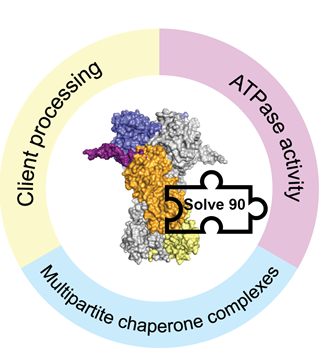Two Open Competition Science-M grants for FSE researchers
Dr Andrea Giuntoli of the Zernike Institute for Advanced Materials and Dr Kasia Tych of the Groningen Biomolecular Sciences and Biotechnology Institute (GBB) have received an Open Competition Science M grant from the Dutch Research Council (Nederlandse Organisatie voor Wetenschappelijk Onderzoek, NWO). Giuntoli receives an M1 grant worth EUR 350,000 for his project ‘Better ultra‐soft elastomers through defects control’. Dr Kasia Tych and Dr Sonja Schmid from Wageningen University & Research (WUR) (coordinator) will together receive an M2 grant worth EUR 700,000. The title of their project is ‘Understanding the master chaperone of our cells’.
M grants are intended for innovative, high-quality fundamental research and / or studies with scientific urgency.
Better ultra‐soft elastomers through defects control | Dr Andrea Giuntoli (Zernike Institute for Advanced Materials)
Defects in materials are not only unavoidable, they can also be used smartly to improve mechanical properties. This idea inspired this project for a new class of ultra-soft rubbers consisting of a cross-linked network of bottlebrush polymers. These materials contain imperfections on various length scales, but it is unknown how this diversity affects the final material properties. With defect engineering as the ultimate goal, various large-scale computer simulations are used in this project which, supplemented with machine learning algorithms, will provide insight into the role of multiscale defects on the mechanical properties of bottlebrush polymer networks.

Understanding the master chaperone of our cells | Dr Katarzyna Tych (GBB) and Dr Sonja Schmid (WUR)

Proteins constitute the molecular machines in our cells. However, many of them would be non-functional without the help of the cell’s master chaperone, Hsp90, which turns them into functional entities. Surprisingly, despite this central role, we still don’t understand how this Hsp90 actually works. Schmid and Tych will therefore use new technology to elucidate the relevant small scale of individual molecules. They will test how Hsp90 is energetically powered, how it treats the other proteins, and how it coordinates its necessary helper proteins. The research will provide a currently missing molecular-level understanding of Hsp90 and thus inform the development of cancer therapeutics.
NWO Open Competition Domain Science-M
M-grants are intended for realizing curiosity-driven, fundamental research of high quality and / or scientific urgency. The grant offers researchers the possibility to elaborate creative and risky ideas and to realise scientific innovations that can form the basis for the research themes of the future.
| Last modified: | 10 July 2023 5.52 p.m. |
More news
-
25 April 2025
Leading microbiologist Arnold Driessen honoured
On 25 April 2025, Arnold Driessen (Horst, the Netherlands, 1958) received a Royal Decoration. Driessen is Professor of Molecular Microbiology and chair of the Molecular Microbiology research department of the Faculty of Science and Engineering at the...
-
24 April 2025
Highlighted papers April 2025
The antimalarial drug mefloquine could help treat genetic diseases such as cystic fibrosis, Duchenne muscular dystrophy, as well as some cancers.
-
22 April 2025
Microplastics and their effects on the human body
Professor of Respiratory Immunology Barbro Melgert has discovered how microplastics affect the lungs and can explain how to reduce our exposure.
